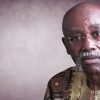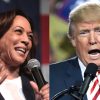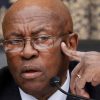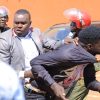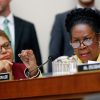The year 1965 began on an ominous and unsettling note—the assassination and martyrdom of Malcolm X, the Fire Prophet. Even in the white and winter cold of February, it was a sign of the coming fire. Indeed, it pointed toward the fiery fulfillment of prophecy which Malcolm, himself, had predicted. It was there, too, in the title of James Baldwin’s classic, The Fire Next Time. And it was the topic of countless conversations around the country. Baldwin had taken his title from a line in a Black gospel song which says: “God gave Noah the rainbow sign, no more water the fire next time.” And this, for us, was the fundamental time of turning when the fire would be this time.
Malcolm, following Messenger Elijah Muhammad, had talked about God’s judgment of and on America and linked it to the rising tide of resistance to White supremacy around the world and to the coming revolt of the oppressed masses of Black people in this country. It was, he taught, only a matter of time before Black people engaged in a rightful and defensive response to the racist and violent oppression by White people, especially the police as well as the whole system of White supremacy itself. As a Muslim, Malcolm stressed divine fire, but those of us who were less religiously inclined read his prophecy as the coming fires of freedom rising from red-hot battles we would wage for a better world. And so we worked, watched and waited for the spark that would ignite the prairie fire and usher in the era of Marcus Garvey’s promised return in the whirlwind.
Fifty one years ago on August 11, the people of Watts rose up in righteous resistance to oppression, especially police abuse, brutality and violence. It began with the arrest of Marquette Frye and the intervention and arrest of his mother, Rena Frye, and his brother, Ronald Frye. It was for the people a final unbearable act by the police, seen as an occupying army in our oppressed and struggling community. And they rose up, and for six days fought running battles with the police who, unable to suppress them, called in the National Guard. They burned down and often emptied before hand stores and shops which they saw as sites and symbols of their exploitation and humiliation. They took over streets abandoned by fleeing police and began to police themselves, conducting traffic and calling for respect for businesses with window signs saying “Black owned” or “Blood Brother.” For a brief moment in history, the people had risen up to say “no” to police brutality and violence, merchant exploitation, and systemic oppression, and “yes” to the right to rebel against oppression and injustice.
After the six days of righteous rage, upraised fists and fiery resistance, the revolt was over, exhausted in its spontaneity and overwhelmed by the force and violence of the established order. But on the seventh day, the community did not rest. After counting the casualties (34 dead, 1100 wounded), binding and bandaging their wounds and burying their dead, the people continued to struggle in honor of the fallen and for the future of the living, fighting for changes in other ways.










